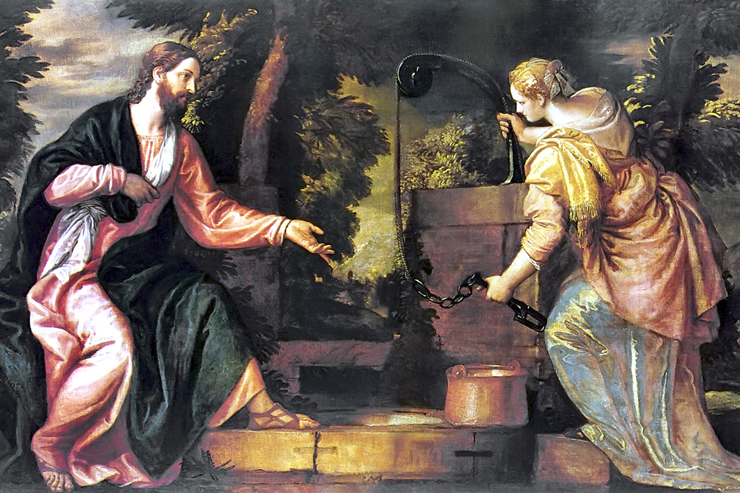
On October 17, the Pew Research Center released the results of a survey that showed that 65 percent of American adults now say that they’re Christians, down 12 percentage points in just the last ten years. Those describing themselves as atheists, agnostics and “nothing in particular” are now at 26 percent of the population, up from 17 percent in 2009. And while Catholics were 23 percent of Americans a decade ago, they constitute today — despite large-scale immigration from Catholic countries — just 20 percent of the adult population.
This article originally appeared in The Anchor, the weekly newspaper of the Diocese of Fall River, Mass, on November 1, 2019 and appears here with the kind permission of the author.
These are staggering declines, and we have all seen the troubling consequences of these shifts. Many Catholic churches, schools, convents and seminaries are now shuttered. Masses in those parishes that have survived often have plenty of empty pews on Sundays. Family members and friends whom we know and love are no longer practicing or believing. Most everyone recognizes that these are not anomalous blips, like an occasional down economic quarter for a major company; they are worrisome trends that give few signs of reversal.
At an institutional level, these tendencies occupy the attention of bishops and chanceries, pastors and parish finance and pastoral councils, Catholic superintendents, principals, and teachers, and many concerned faithful. At a personal level, however, they occupy a great deal of the minds and hearts of parents, grandparents godparents, spouses, siblings, sons, daughters and friends as they pray for their loved ones whose choices have helped establish those trends. Many are discouraged. Many don’t know what to do or to say. Many lament that their prayers and interventions do not seem to be bearing any fruit.
Whereas priests are always asked to pray for individual’s family members and friends who might be in need of conversion, and to give encouragement and counsel to those who are concerned about the temporal and eternal stakes of choices their loved ones are making with regard to themselves or their children, such requests are coming more frequently now — and with a conspicuous sense of despair and desperation. Many are saying, essentially, “Father, my prayers have failed. The situation is just getting worse. I’m about to give up. As a last resort, I’m hoping somehow your prayers can work a miracle.”
Prayers for loved ones do work miracles.
We see it throughout the Gospel. At the pleading of moms and dads, Jesus exorcizes a girl (Mt 15), raises another from the dead (Lk 8), heals one boy of epilepsy (Mt 7) and another of life-threatening illness (Jn 4). At the entreaty of a Centurion he heals a slave (Lk 7) and at the faith-filled ingenuity of friends, Jesus healed a paralytic of his sins and made him walk again (Mk 9). Jesus hears and responds to prayers of intercession for loved ones.
We’ve seen in the lives of the saints how prayers for others have similarly worked many moral miracles of conversion. St. Stephen’s prayers for those who were stoning him were efficacious in the life of Saul of Tarsus (Acts 7). St. Monica’s 17 years of preserving prayer for the conversion of her husband and additional 15 years for her son Augustine not only led to their new life but also to her becoming, too, a great saint. St. Therese of Lisieux’s prayers for an impenitent condemned criminal Henri Pranzini led, it seems, immediately before his execution, to his asking for a crucifix and kissing Christ’s wounds.
Such miracles still happen.
I’ve witnessed the beautiful scene of the Good Thief recapitulate itself when people have asked me to come to the besides of family members who have been away from God for decades and who have said they don’t want to see a priest. Their insistent prayers and love and God’s grace have triumphed time and again. I’ve similarly witnessed it in confessionals with those whom St. John Vianney used to call “big fish,” coming back after decades away. When to break the ice I gently ask what kept them away for such a long time and what brought them back, several have told me that they knew their mother, or spouse, or best friend or even young kids had been praying for them.
Just a month ago a priest friend had his prayers answered for his estranged father. He was informed that his dad did not have much time left. He visited him and the father began asking questions about whether hell really existed. His son told him that it did but that he would be happy to call a priest friend to come to hear his confession, prepare him for death, and help him avoid that possibility. The father replied, “You’re a priest. Can’t you hear my confession?” The father died reconciled in more ways than one.
Jesus tells us to pray with insistence and confidence. He gives the Parables of the Friend at Night (Lk 11) and the Importune Woman (Lk 18) to stress how we should “pray always without losing heart,” guaranteeing that “everyone who asks, receives.” That doesn’t mean we always get exactly what we ask when we ask. There’s free will on the part of the person for whom we’re praying and God may have a better plan than for what we’re begging. But he promises not to turn a deaf ear. He cares for us more than he does the lilies and the sparrows. He loves our loved ones more than the most loving parents of all time have loved their children.
Let’s get to some practical tips about praying for those who have chosen to stop, or drifted away from, the practice of the faith or others who need prayers to take it up for the first time.
First, so that our prayer doesn’t get reduced simply to prayer of petition, which can narrow our relationship with God, we should exercise all five different forms of prayer. We should praise and bless God for how lovable and merciful he is. We should thank him for his saving will, patience, fatherly solicitude, and for sending his Son and the Holy Spirit to make conversion possible. We should ask his forgiveness for all those sins — ours and others’ — that have led those we care about to turn away from the faith. We should make petition for ourselves, to grow in patience and hope as we pray perseveringly and seek to become an instrument of the Holy Spirit. Finally, we should make intercession for our lost sheep, that God will have mercy on them and perhaps send someone who can reach them at the depth God wants to and bring them home. Our intercession should be simple and straightforward: “Lord, the one that you love needs your help.”
Second, we should recognize we aren’t praying alone. Christ has prayed for our loved ones from the Cross and intercedes for them at the Father’s right side. The Blessed Mother prays for her children more than St. Monica prayed for Augustine. Guardian angels are praying. Cloistered religious in convents across the globe and so many others — essentially the whole Church in heaven and on earth —are praying. We should take confidence.
Third, if they’re engaging in sinful behavior, they need to know the moral truth, but don’t need to be reminded of it all the time. We can’t reduce people, in our prayer and interactions, to their sins. When they know we look at them as good, they’re generally open to our kind encouragement to become better. When we praise them for what they do right, for their areas of virtue, then they can receive our gentle call to conversion as coming from a fan rather than a critic. In short, in our prayer and conduct, we should try to draw them toward the beauty of the faith, to the Good News, rather than to “scare the Hell out of them” by focusing excessively on sin and the death to which sin leads.
Fourth, as we see with the disciples on the Road to Emmaus (Lk 24), the reasons why people leave the faith often contain the seed for their return. This should influence both our prayer and action. The two disciples couldn’t understand how the supposed Messiah could have be slaughtered by the same Romans they anticipated he would extirpate. After Jesus appeared as an unknown wayfarer and helped them to grasp that the Messiah had to suffer, what seemed to be a great contradiction became a great confirmation. If people leave, for example, because of hypocrisy in the Church, we need to share their hatred of hypocrisy and help them discover those who live the faith with integrity.
Fifth, our prayer and life should radiate hope. The conversion of the Good Thief reminds us that as long as they’re alive, there’s still time. Things can happen, like hitting rock bottom, or a diagnosis of a serious illness, that can lead to people opening up to God anew. Even after people have died, since God is eternal, our prayers in time can impact the past, and so we should persevere praying with hope in God’s mercy and saving will.
The Pew Research Center study is ultimately a summons for the whole Church to pray more and with greater insistence. The Lord has given each of us plenty of people to pray for. And, as we intercede for others, like with St. Monica, the Lord will strengthen our faith as well.
Please share on Facebook and other social media below.













